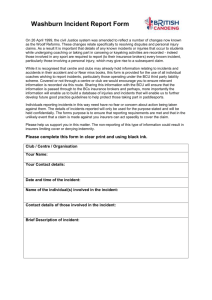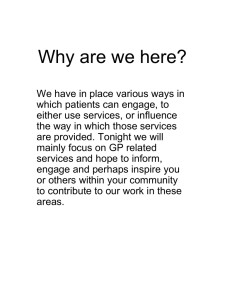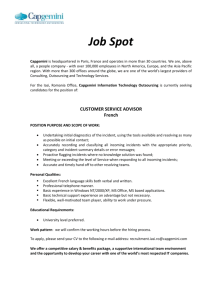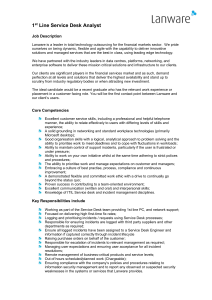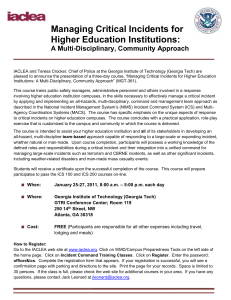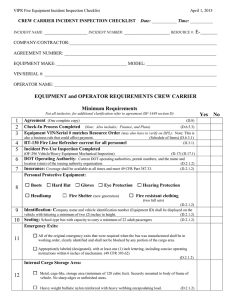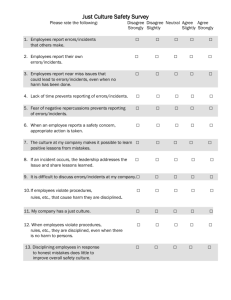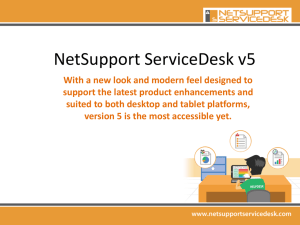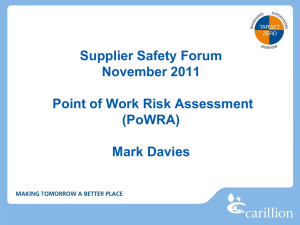Primary Care Mental Health Service
advertisement
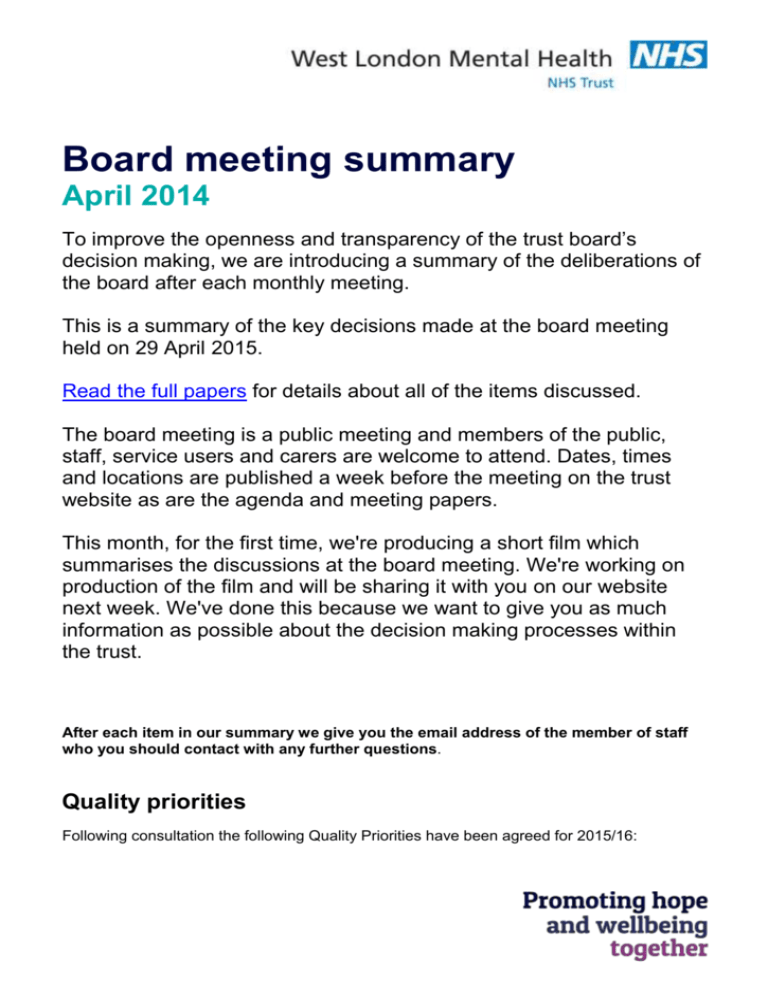
Board meeting summary April 2014 To improve the openness and transparency of the trust board’s decision making, we are introducing a summary of the deliberations of the board after each monthly meeting. This is a summary of the key decisions made at the board meeting held on 29 April 2015. Read the full papers for details about all of the items discussed. The board meeting is a public meeting and members of the public, staff, service users and carers are welcome to attend. Dates, times and locations are published a week before the meeting on the trust website as are the agenda and meeting papers. This month, for the first time, we're producing a short film which summarises the discussions at the board meeting. We're working on production of the film and will be sharing it with you on our website next week. We've done this because we want to give you as much information as possible about the decision making processes within the trust. After each item in our summary we give you the email address of the member of staff who you should contact with any further questions. Quality priorities Following consultation the following Quality Priorities have been agreed for 2015/16: Patient Safety To reduce the use of restrictive interventions, including physical restraint, seclusion and long term segregation. To ensure that there is a positive and open culture of reporting incidents and implementing and embedding the lessons that are learnt. Patient Experience To improve communication with service users by providing them with timely information regarding their care, including clearly identified people who are working with them and collaborative risk management planning To ensure that our service users and patients are treated in the best possible clinical environments and that these are at all times clean, safe and therapeutic Clinical Effectiveness To improve the physical health of our service users, patients and staff through the implementation of smoke free services and improved physical health monitoring and awareness Improving the safety culture The trust is the lowest incident reporter amongst mental health trusts. The Board agreed this needed urgent and focused attention to address two key Issues: the organisational culture and the reporting systems. Our work to improve incident reporting will look at using root cause analysis rather than focusing on individuals. We will improve training in root cause analysis and ensure that staff at induction receive appropriate training. As an organisation we will champion reporting and ensure staff and service users receive feedback on outcomes of reporting/reviews. Chairman Tom Hayhoe said: 'An important sign of a healthy safety culture is that staff report incidents without fear of reprisals. I want our trust to develop an open approach to incident reporting because we know that NHS trusts that are high incident reporters are safer and offer better quality care to patients.' Medical director, Dr Nick Broughton added: 'We need to focus on the root causes of incidents, not the individuals. And we need to take better account of the context in which incidents happen on busy wards. We will look at how we can improve the structure of reports, and training in root cause analysis among a number of initiatives to ensure we improve our safety culture and incident reporting from today.' The trust is working with Imperial College Health Partners to improve measuring and monitoring patient safety with the hope of rolling out a trustwide programme. The project will build on the work of Professor Vincent Charles who influenced patient safety programmes at Salford Royal Hospital, an acute trust with the best safety record in the country. Two workshops were held with three teams and generated real enthusiasm for reporting and learning and this project will be taken forward by the medical director. Contact: Dr Nick Broughton, medical director Care Quality Commission Inspection Steven Michael, chief executive of South West Yorkshire Partnership NHS FT will chair the trust's CQC inspection which takes place during the week of 8 June. Work is on-going to prepare staff for the inspection and to inform service users and carers as well as stakeholders about the inspection and what to do if they are asked for their views of trust services by the inspectors. Contact: CQC.inspection@wlmht.nhs.uk Clinical staff appraisals, assessments and certification The trust is a now a top performer in ensuring its medical workforce has robust appraisals and the Board complimented deputy medical director, Dr Clare Lucey, and the team for achieving this. Beverley Murphy, director of nursing and patient experience, is developing a nursing assessment tool in preparation for nurse revalidation which will be a requirement in future. This project is being done in conjunction with the University of West London. The care certificate for healthcare support workers was launched this month. Its purpose it to help support workers develop the values, behaviours, competencies and skills needed to deliver high quality care with compassion. This certificate will be a requirement for all new healthcare assistants and support workers in clinical roles. Transforming local services The Shifting Settings of Care project has successfully met its target, moving a significant number of service users safely to primary care-led mental health services. Shifting Settings of Care is a project to improve quality of care for people with stable mental health conditions, by moving them into a GP-led primary care mental health service staffed by specialists in mental health care. This is a major achievement for Dr Chris Bench, the trust's clinical director of primary and planned mental health care, and the team and the Board thank staff for their hard work, in making this change happen. Contact: Sarah Rushton, director of local and specialist services Forensic services The redevelopment of the medium secure unit on the Three Bridges Medium Secure Campus in Ealing is progressing well. Following consultation with staff and discussion with service users and carers, the clinical model of care for forensic care pathways has been agreed. Work is ongoing with clinicians and the redevelopment team to plan the workforce for the new medium secure unit, Thames Lodge. A workshop was held during April and further ones are being planned. Contact: Leeanne McGee, director of high secure and forensic services Performance report - a summary Quality: clinical effectiveness CRHT gatekeeping: Performance improved and is above the 95% target March (97%) Q4 performance is 96%. Quality: patient experience Complaints increased 47% (47)in March from 32 in February. The top 3 themes were care and treatment (28%), staff attitude (23%) and patient property and expenses (17%) Number of complaints closed outside agreed timeframe: 5 out of 23 (22%) complaints were closed over the agreed timeframe. One in high secure services and four in local services due to late investigation report submissions, final response amendments due to poor quality / further investigation required. The cumulative response rate has decreased in Q4 from 88% to 87%. The Trust target is 90% • Inpatient readmissions rate: decreased to 8.2% ) in February. This KPI is reported for local services only where we are analysing reasons for the readmissions. Quality: patient safety Number of grade 1 Incidents commissioned: There were 5 grade 1 incidents commissioned in March, which is a significant decrease from the previous month when there were 9. CPA 7 day follow up: Performance in February was (94.3 %) against a 95% target. CPA review 12 months: Our performance is improving as a result of proactive work by the information team, data quality managers and services. Although performance is just below the 95% target in latest published data (94.4%) Workforce Indicators Average number of weeks to fill a vacancy: All recruitment campaigns were completed within the 15.5 weeks, a significant improvement to when Capita held the recruitment team and the turnover rate is 12.5% which shows steady improvement quarter upon quarter.

